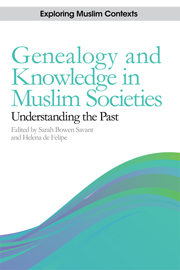Book contents
- Frontmatter
- Contents
- List of Figures and Tables
- Introduction
- Part One The Generation of Genealogical Knowledge
- Part Two Empowering Political and Religious Elites
- Part Three Genealogy as a Source for Writing History
- 7 Was Marwan ibn al-Hakam the First “Real” Muslim?
- 8 Genealogy and Ethnogenesis in al-Mas‘udi's Muruj al-dhahab
- 9 Genealogical Prestige and Marriage Strategy among the Ahl al-Bayt: The Case of the al-Sadr Family in Recent Times
- About the Contributors
- Index
9 - Genealogical Prestige and Marriage Strategy among the Ahl al-Bayt: The Case of the al-Sadr Family in Recent Times
from Part Three - Genealogy as a Source for Writing History
Published online by Cambridge University Press: 05 September 2014
- Frontmatter
- Contents
- List of Figures and Tables
- Introduction
- Part One The Generation of Genealogical Knowledge
- Part Two Empowering Political and Religious Elites
- Part Three Genealogy as a Source for Writing History
- 7 Was Marwan ibn al-Hakam the First “Real” Muslim?
- 8 Genealogy and Ethnogenesis in al-Mas‘udi's Muruj al-dhahab
- 9 Genealogical Prestige and Marriage Strategy among the Ahl al-Bayt: The Case of the al-Sadr Family in Recent Times
- About the Contributors
- Index
Summary
“Because we are linked by blood and blood is memory without language.”
Joyce Carol Oates, I Lock My Door Upon MyselfHistorians have given little sustained attention to the customs of nobility within Islamic civilisation. The role of genealogy in shaping political, religious and social realities appears to have been overlooked particularly, or even ignored, in the case of the contemporary history of the Middle East. This, at least, is the case with the Family of the Prophet (Ahl al-Bayt). However, observed through the lens of genealogical prestige and marriage strategies, the role and behaviour of the descendants of the Family of the Prophet in recent times reveal customs of nobility that are close, or at least similar, to those witnessed in European history. Bearing in mind the vast literature on marriage policies among the European nobility, this chapter argues that the socio-political categories developed in order to analyse the history of eminent families in European history, in particular for the late Middle Ages and for modern history, are relevant and useful in understanding the role of eminent families of the Ahl al-Bayt in contemporary Islamic societies.
The case study discussed here concerns the marriage strategy of a politically and religiously relevant ‘Alid branch of the Ahl al-Bayt, the al-Sadr. The choice of this family is based on its centrality to the Shi‘i religious establishment, as we have more data available on the marriages of its members than for other families of the Ahl al-Bayt.
- Type
- Chapter
- Information
- Genealogy and Knowledge in Muslim SocietiesUnderstanding the Past, pp. 131 - 148Publisher: Edinburgh University PressPrint publication year: 2014

